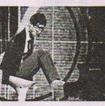-Which would you like, a cup of tea or a glass of milk?- ______. I think I’ll just have a glass of water.A. BothB.NeitherC.NoneD.Either-九年级英语
a.在简短对话中,当人称代词单独使用或在not后,多用宾语。
---- I like English. --我喜欢英语。
---- Me too. --我也喜欢。
---- Have more wine? --再来点酒喝吗?
---- Not me. --我可不要了。
b.在表示比较的非正式的文体中,常用宾格代替主格。但如果比较状语的谓语保留,则主语只能用主格。
He is taller than I/me.
He is taller than I am.
二、主格代替宾格
a.在介词but,except后,有时可用主格代替宾格。
b.在电话用语中常用主格。
---- I wish to speak to Mary. --我想和玛丽通话。
---- This is she. --我就是玛丽。
注意:在动词be或to be后的人称代词视其前面的名词或代词而定。
I thought it was she. 我以为是她。 (主格----主格)
I thought it to be her. (宾格----宾格)
I was taken to be she. 我被当成了她。 (主格----主格)
They took me to be her.他们把我当成了她。 (宾格----宾格)
人称代词用法:
一、人称代词的宾格在句中作宾语,往往用在动词或介词后面。
例:1.Listen to me,Dad.
2.Peter is sitting behind me.
3.Let me got here now.
4.Give me an orange,please.
二、you既是"你"或"你们"的主格,又是它们的宾格;her既是"她"的所有格,又是它的宾格。我们可以根据它们在句子中的位置来判断它们属于主格、所有格还是宾格。
三、and是一个我们常用来连接两个词的连接词。它虽然与介词with有同样的意思,但它的前后可以是人称代词的主语,也可以是人称代词的宾格,而with只能跟人称代词的宾格。
如:You and I are going to school.
You are going to school with me.
四、第三人称代词单数:er,sie,es 及 复数 sie 可指代人或物以及其它抽象概念等。此时,它们的性,数,格要与被指代的名词一致。
人称代词用法口诀:
人称代词分主/宾,只有八对要区分。
你(们)、它主/宾同一形,其余主/宾须分清。
谓语之前主格填,动/介之后宾格跟,
口语运用最灵活,表语也可用宾格。
人称代词并列现,注意顺序礼貌见,
二一、三一、二三一,第一人称最谦虚,
若把错误责任担,第一人称须当先。
动前主格动后宾,名前形容介后宾;
如果名词含在内,选用名物代就行。
人称代词并列用法的排列顺序:
1)单数人称代词并列作主语时,其顺序为:
第二人称→第三人称→第一人称
即:you and I;he/she/itandI;you,he/she/it and I
2)复数人称代词作主语时,其顺序为:
第一人称→第二人称→第三人称
即:we and you;you and they;we,you and they
|
人称 |
单数 |
复数 | ||
|
主格 |
宾格 |
主格 |
宾格 | |
|
第一人称 |
I |
me |
we |
us |
|
第二人称 |
you |
you |
you |
you |
|
第三人称 |
he |
him |
they |
them |
在一般现在时中,当主语是第三人称单数时,谓语动词要用第三人称单数形式,即常在动词原形后加-s或-es
一、人称代词he,she,it是第三人称单数。如:
He likes watching TV. 他喜欢看电视。
She has lunch at twelve. 她十二点吃午餐。
It looks like a cat. 它看起来像只猫。
二、单个人名、地名或称呼作主语;是第三人称单数。如:
①Han Mei looks like her mother. 韩梅看起来像她的母亲。
②Beijing is in China. 北京在中国。
③Uncle Wang often makes cakes. 王叔叔经常做蛋糕。
三、单数可数名词或"this / that / the+单数可数名词"作主语时,是第三人称单数。如:
①A horse is a useful animal. 马是有用的动物。
②This book is yours. 这本书是你的。
③That car is red. 那辆小汽车是红色的。 ④The cat is Lucy's. 这只猫是露茜的。
四、不定代词someone,somebody,nobody,everything,something等及指示代词this,that作主语时,是第三人称单数。如:
①Everyone is here. 大家到齐了。
②There is something wrong with the watch. 这块手表有毛病。
③This is a pen. 这是一支钢笔。
④That is an eraser. 那是一块橡皮擦。
五、不可数名词作主语时为第三人称单数。如:
①The milk is in the glass. 牛奶在玻璃杯里。
②The bread is very small. 那面包很小。
六、当数字或字母作主语时,看作第三人称单数。如:
①"6" is a lucky number. "6"是个吉利数字。
②"I" is a letter. "I"是个字母。
考点名称:it 的用法
- “It”用法及其句型和固定搭配,是英语语法的重点、难点,又是近几年考试的热点,因此在复习中应给予足够的重视。
- It 句型归纳:
1. It is +adj.(+for sb./sth.) + to do sth.
用于此句型的形容词有:easy, hard, difficult,possible, important, impossible, necessary, good, bad, exciting, interesting, surprising等。如:
It is necessary to change your job.
It was very hard for them to walk such a long way in the snow.
2.It is +n.(+for sb./sth.) + to do sth.
用于此句型的名词有: pity, shame, pleasure, one’s duty, one’s job, fun, joy, good manners, bad manners等。如:
It is a pity for you to have missed such a wonderful play.
It is bad manners for the young to take up the seats for the old.
3.It is +adj.+of sb.+to do sth.
此句型中的形容词主要描述某人的品德、特征。能用于该句型的形容词有: kind, nice, wise,
silly, polite, impolite, friendly, foolish, clever等。如:
How silly it was of you to give up such a good chance!
It is friendly of the family to try to make me feel at home in their house.
4.It is +adj.(+n.)+doing sth.
此句型中的形容词和名词常见的有:no/little use, no/much good, useless等。如:
It’s no use crying over spilt milk.
5.It takes sb.+一段时间+to do sth. 表示“做某事花费某人多长时间”。如:
It took us half an hour to ride to the town by the sea.
6.It is +及物动词的过去分词+that从句
此句型中常见的及物动词的过去分词有:said, told, known, reported, recorded, thought, believed, considered等。如:
It is reported that the Russian President will visit China next week.
7.It +不及物动词+that从句
此句型中不及物动词常见的有:seem, happen, appear, matter等。如:
It seems that there will be a heavy snow tomorrow.
It happened that I met my good friends in the museum yesterday.
8.强调句型:It is+被强调部分+that/who从句
在使用强调句型时要注意,指人时可以用who或that,其它情况一律用that。如:
It was under the bed that my brother hid the ball this morning.
It is Mr Bell who/that often comes and looks after the old man.
9.It is/has been+一段时间+since从句。如:
It is /has been three years since we saw each other last.
10.It is (high) time that sb. did sth.
该句型表示“某人现在该做某事了”,从句常用过去时(虚拟语气)说明现在应该做的事情。如:
It’s six o’clock.It is high time that we went home now.
It 常用的固定搭配:
1. make it
(1)在口语当中相当于succeed,表示:成功、做到、说定、赶上、及时到达
例 It's hard to make it to the top in show business.
(2)在口语中相当于fix the date for,表示“约定好时间”
例 —Shall we meet next week?
—OK. We just make it next Saturday.
2. as it is
(1)相当于in fact,in reality表示“事实上,实际情况是……”
- 最新内容
- 相关内容
- 网友推荐
- 图文推荐
| [家长教育] 孩子为什么会和父母感情疏离? (2019-07-14) |
| [教师分享] 给远方姐姐的一封信 (2018-11-07) |
| [教师分享] 伸缩门 (2018-11-07) |
| [教师分享] 回家乡 (2018-11-07) |
| [教师分享] 是风味也是人间 (2018-11-07) |
| [教师分享] 一句格言的启示 (2018-11-07) |
| [教师分享] 无规矩不成方圆 (2018-11-07) |
| [教师分享] 第十届全国教育名家论坛有感(二) (2018-11-07) |
| [教师分享] 贪玩的小狗 (2018-11-07) |
| [教师分享] 未命名文章 (2018-11-07) |


![—______ is Jenny.—I’m Gina. Nice to meet you.[ ]A. I’mB. His nameC. I’mD. My name-七年级英语](http://www.00-edu.com/d/file/ks/4/2/wuzhudaici/2019-11-29/small48b153aa794daeb090c5d2505d5cbbac1575042450.png)



